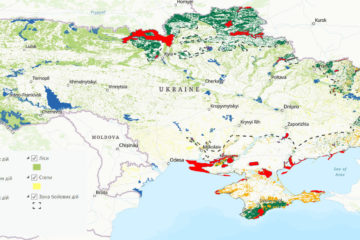The biodiversity concept in crisis? Global tendencies and a view from Ukraine
Igor Zagorodniuk (1), Zoltan Barkaszi (1), Oleksandr Protasov (2), Vasyl Prydatko-Dolin (3)
1 National Museum of Natural History, NAS of Ukraine (Kyiv, Ukraine)
2 Institute of Hydrobiology, NAS of Ukraine (Kyiv, Ukraine)
3 National University of Life and Environmental Sciences of Ukraine (Kyiv, Ukraine)
Abstract
The concept of biological diversity (BD) emerged in the early 20th century, and since then the term has been widely used in both scientific and popular science, often as a substitute for the concepts of species richness and species diversity. ‘Biodiversity’ has grown into an extensive scientific concept that underpins the theoretical and practical foundations of nature conservation around the world. However, there are many critics of the concept of biodiversity, in particular because of the lack of unambiguous definitions that would simultaneously include the entire scope and all levels and aspects of the diversity of living matter. As a rule, diversity studies focus on such aspects as ‘rarity’, ‘threatened’, and ‘extinction’, which in practical terms is manifested in the attempt to preserve rare and endangered genetic, taxonomic, and ecological units, while the vast majority of living things are left out. So, is the concept of biodiversity in general in a real crisis, or is there only a crisis of diversity of definitions, that is, the theoretical foundations of this concept, particularly in the light of scientific achievements of the 20th and 21st centuries? In this paper, we examine the conceptual positions on biodiversity and the arguments against their paradigmatic nature and general viability, which were brought to public discussion in the article ‘The case against the concept of biodiversity’ by the well-known researcher and journalist Clare Fieseler, published on the well-known American news and explanatory journalism website Vox (2021). From this article, we have identified seven controversial aspects of the current understanding and perception of the concept of biodiversity. The problems associated with the interpretation of the term ‘biodiversity’, biotic diversity as a dynamic system, current trends in biodiversity research, and the contribution of Ukraine to the development of the concept of biodiversity are also discussed. The ideas of pluralism of biodiversity concepts and the possibility of an updated interpretation of this term are considered. The challenges Ukraine faces in times of a great upheaval, in particular in the context of war and catastrophic destruction of natural complexes, are detailed.
***
An excerpt from the ‘Afterword’ section:
‘So, is there a crisis in the concept of biodiversity, as the title of this article suggests? After all, we could mention that the long-term crisis has actually taken place, both in the form of relatively minor events, such as the appearance in the media of the Pyron’s publication, which did not really deserve the loud publicity it had acquired, and up to a very powerful shrapnel of phenomena − from the unwillingness of the entire network of international environmental institutions of the world to respond immediately to noticeable losses of biodiversity, to the complete unpreparedness of societies to quickly assess such damages, especially to present them in international courts in order to obtain adequate compensation from the aggressor. From now on, however, the compensation for the loss of biodiversity and the destruction of ecosystems should be, if not equal, then even greater than the sanctions already imposed on the Russian Federation. However, everything related to bio+diversity will have to be re-evaluated and proven. The very first step should be the general recognition of the absolute value of biodiversity and its manifestations, according to the meaning of the interpretation, which is obviously broader and deeper (than is generally known), because the uncorrected reduction of this concept (by officials, politicians and journalists to primitive lists of species or other objects) is unacceptable. A sign of the crisis was not only an open media ‘campaign to bring biodiversity to the people’, but also a vicious circle of attempts by amateur activists to over-popularize this precious concept (as if for the sake of the cause, but actually to its detriment), which on the contrary led to a dangerous simplification and emasculation of such a concept as bio+diversity of planetary importance. Let’s remember from now on that due to the consequences of the Great War, biodiversity should be the object of attention of specialists as well as a priority field requiring high professional knowledge, the communication of which to the general public can be considered not only as a high intellectual art, but also as an urgent necessity for survival not only of Ukrainians, but also of all peoples of Europe.’
2023 • vol. 24, pp 183–213
GEO&BIO https://doi.org/10.15407/gb2413





